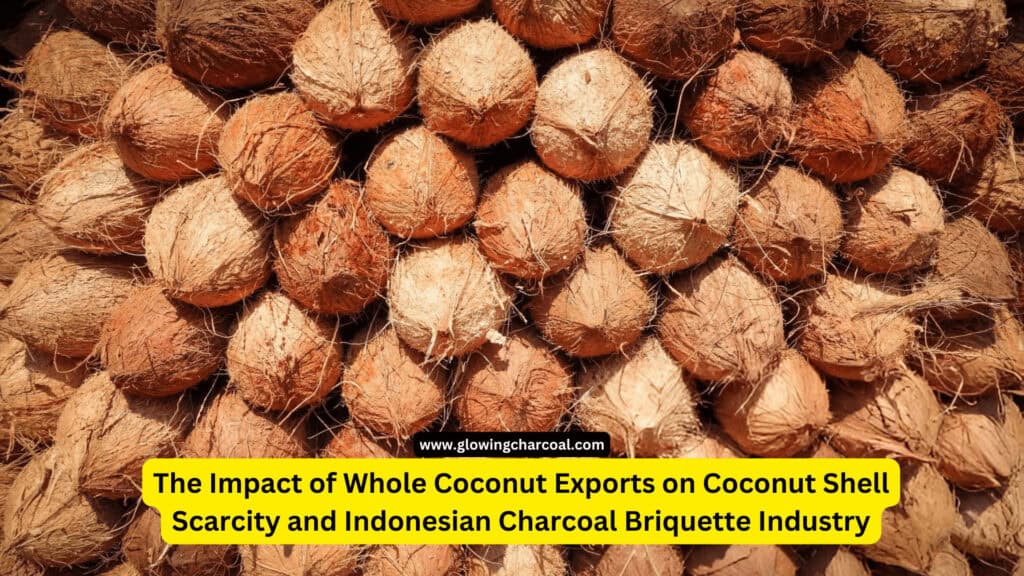The Impact of Whole Coconut Exports on Coconut Shell Scarcity and Indonesian Charcoal Briquette Industry

Indonesia, known for its vast coconut plantations and rich tradition in coconut-based products, has long been a leading global exporter of coconut-derived goods. One key sector within this industry is the production of coconut charcoal briquettes, highly valued for their efficient burning and environmental benefits, particularly in shisha and BBQ markets worldwide. However, a pressing issue has emerged in recent years that poses a significant threat to the sustainability of this industry: the increasing shortage of coconut shells due to massive exports of whole coconuts.
Understanding the Coconut Charcoal Briquette Industry in Indonesia
The Indonesian coconut charcoal briquette industry relies heavily on coconut shells as a primary raw material. These shells are a byproduct of copra (dried coconut meat) and coconut milk production, ensuring that virtually no part of the coconut goes to waste. This sustainable cycle has long supported not only local industry but also provided a competitive advantage on the global market, where high-quality, eco-friendly fuel sources are increasingly sought after.
Coconut charcoal briquettes are especially popular in Middle Eastern countries for shisha, as well as in Europe and other regions for barbecuing and incense burning. The demand for high-quality, durable, and long-burning charcoal has propelled Indonesia to the forefront of this niche market, making it a vital part of the country’s economic output.
The Surge in Whole Coconut Exports
Over the past decade, the global demand for whole coconuts has surged, driven by their use in food products, beverages, cosmetics, and health supplements. Countries with limited access to fresh coconuts have increasingly looked to Indonesia as a key supplier. This shift in demand has resulted in a significant increase in the export of whole coconuts, including to markets in China, the Middle East, and Europe.
The allure of exporting whole coconuts lies in the immediate economic benefit. Fresh coconuts command a higher price than processed derivatives like coconut oil or copra, incentivizing many producers and exporters to prioritize the trade of whole coconuts. However, this shift has far-reaching consequences for downstream industries that depend on the byproducts.
The Resulting Scarcity of Coconut Shells
One of the most critical consequences of the increased export of whole coconuts is the reduced availability of coconut shells, which are an essential raw material for the charcoal briquette industry. When whole coconuts are exported, their shells go with them, significantly diminishing the local supply that once fueled the production of charcoal briquettes.
This shortage has several notable impacts:
Rising Costs of Raw Materials: The scarcity of coconut shells has driven up their market price, squeezing profit margins for manufacturers of charcoal briquettes. Factories that were once able to source shells affordably now face intense competition, pushing up operational costs and potentially reducing their output capacity.
Operational Challenges: Smaller and mid-sized charcoal briquette producers are particularly vulnerable, as they often lack the financial leverage to compete with larger buyers in securing the raw materials they need. This can lead to production delays or even the cessation of operations in some cases.
Supply Chain Disruptions: The coconut charcoal industry is a critical part of Indonesia’s export economy, with products shipped to markets around the world. Disruptions in the supply of coconut shells mean that orders cannot be fulfilled reliably, threatening Indonesia’s position as a leading supplier and risking a loss of trust from international buyers.
The Broader Economic and Environmental Impact
The issue extends beyond the immediate effects on the charcoal briquette industry:
Local Employment: The production of charcoal briquettes provides employment for thousands of Indonesians, from factory workers to logistics providers. The reduction in output due to the raw material shortage could lead to job losses and reduced economic stability in regions heavily reliant on this industry.
Environmental Concerns: Coconut shells that are not utilized locally may end up as waste or be incinerated in importing countries, contributing to environmental issues. Locally, the sustainable use of coconut shells in the charcoal industry helps manage waste and reduce the carbon footprint by providing an alternative to fossil fuels.
Glowing Charcoal Indonesia’s Commitment to Sustainability
Amid these challenges, Glowing Charcoal Indonesia has taken proactive measures to secure a stable and sustainable supply of coconut shells. The company has established partnerships with numerous local coconut farmers, creating long-term agreements that ensure a steady flow of raw materials. By working directly with farmers, Glowing Charcoal Indonesia not only guarantees its supply but also supports local communities and fosters an ecosystem where coconut producers benefit from stable income and sustainable practices.
These partnerships allow Glowing Charcoal Indonesia to remain resilient even as the industry grapples with raw material shortages. Clients and partners can rest assured that the company’s operations are backed by robust sourcing strategies that prioritize consistency, quality, and sustainability. This commitment reinforces Glowing Charcoal Indonesia’s position as a reliable supplier of high-quality coconut charcoal briquettes and upholds its reputation on the global stage.
Potential Solutions and Industry Response
Addressing the shortage of coconut shells requires coordinated efforts between policymakers, industry players, and coconut producers. Some potential solutions include:
Balanced Export Regulations: Implementing regulations that limit the export of whole coconuts or impose quotas can help ensure that sufficient shells remain available for domestic use. This approach seeks to strike a balance between capitalizing on whole coconut exports and maintaining a sustainable supply for local industries.
Sustainable Coconut Cultivation: Encouraging the cultivation of additional coconut plantations to meet both export and domestic processing needs could alleviate the pressure on existing resources. Such efforts would need to be supported by government incentives and initiatives.
Innovative Sourcing Strategies: Charcoal briquette manufacturers may need to explore alternative raw material sources, such as coconut husks or mixed agricultural byproducts, to diversify their supply chain and mitigate reliance solely on coconut shells.
Recycling Initiatives: Developing programs that promote the collection and recycling of used coconut shells from domestic consumption could help bolster supply levels. For instance, partnerships with food and beverage businesses that use fresh coconuts could create a feedback loop for raw materials.
The growing global demand for whole coconuts presents an economic opportunity for Indonesia but also poses a significant challenge to the coconut charcoal briquette industry and related sectors. While this challenge is significant, companies like Glowing Charcoal Indonesia are leading the way in maintaining a secure supply chain through strategic partnerships and sustainable practices. This proactive approach ensures continued production and supports Indonesia’s standing as a world leader in coconut products. By balancing export benefits with local sustainability, the industry can thrive while supporting the broader economy and the environment.
